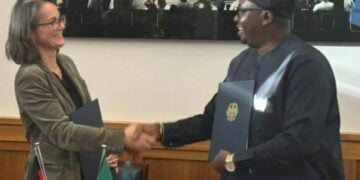Chairman of Heirs Holdings and United Bank for Africa (UBA), Tony Elumelu, has called on African governments to urgently unlock the continent’s vast pension funds and fix its electricity crisis if they truly desired to power inclusive growth, innovation, and prosperity.
Speaking at the launch of the UBA White Paper titled ‘Banking on Africa’s Future: Unlocking Capital and Partnerships for Sustainable Growth’ on the sidelines of the 2025 World Bank/IMF Annual Meetings in Washington DC, Elumelu charged governments across the continent to fix the challenge of electricity and fix it fast.
Commenting on the white paper on mobilising over $4 trillion in untapped domestic capital across Africa, Elumelu said the continent can no longer depend on foreign capital for development while sitting on idle resources that could be put to productive use.
According to him, more than half of Africa’s population still lacks access to electricity, a situation he described as “unacceptable and incompatible with the ambition of building a digital and AI-driven economy.
“Electricity is so critical to power data and AI revolution. Over 50 per cent of our people don’t have access to electricity. It’s unacceptable. We have been saying ‘Africa rise’ for 25 years. Enough talk. Let’s get to work and fix things, starting with improving access to electricity. Our youth are not asking for sympathy. They are asking for systems that work.”
Stressing that sustainable development must be financed from within, beginning with the continent’s pension and sovereign funds, Elumelu lamented that trillions of naira and dollars in pension assets are currently locked up in low-yield instruments such as treasury bills and sovereign securities instead of being channelled into infrastructure, manufacturing, and renewable energy.
“Getting pension funds and investing them in treasury bills is not what will help Nigeria or Africa develop. You need to go and invest in critical sectors. There might be 5 per cent loss, 10 per cent loss, no problem. We’ll learn over time. But we need it to work for the African people.”
Elumelu cited the United States and other advanced economies as examples where pension funds played a pivotal role in financing industrial and technological growth. He commended Nigeria’s establishment of the Contributory Pension Scheme (CPS) under former President Olusegun Obasanjo as a visionary reform, but stressed that the time has come for those funds to “go to work” for national development.
“The pension fund is one of the best initiatives Nigeria has undertaken, but now it must be deployed strategically. We have the potential to mobilize about $4 trillion in Africa, let’s get to work and mobilize this. And then we can now call on our friends and other investors to come also. And as far as we are mobilizing $4 trillion, more will come in, because people will see that we are serious. And when we show that seriousness, they will come in to invest in us,” he stated.
On electricity, Elumelu reiterated that the power sector remains the single most critical barrier to Africa’s transformation, warning that without reliable energy, the continent’s digital ambitions would remain a mirage.
The UBA white paper, which was unveiled at the global meeting, called for collaboration among African governments, development finance institutions, and private investors to mobilise domestic resources for long-term growth.
Elumelu further urged policymakers to demonstrate leadership by creating the right environment for investment, saying local capital mobilisation would signal seriousness to international investors and attract even more funds into Africa’s growth sectors.





